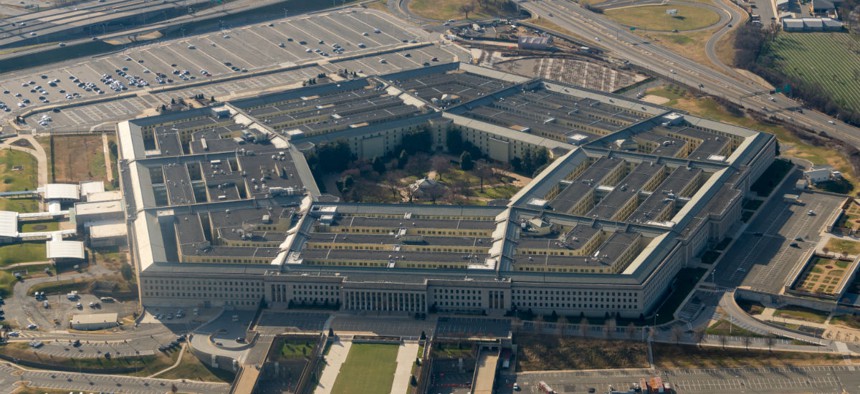
Defense Department file photo
Pentagon Shows Bumpy Progress Toward Curbing Improper Payments
Watchdog hones in on failure to meet four out of six statutory requirements.
As the agency with the largest budget, the Defense Department continues to make shaky progress in the governmentwide push to reduce improper payments, the Pentagon’s inspector general reported on Friday.
The watchdog’s required annual review of fiscal 2017 estimates of significant improper payments showed that the department had complied with only two of six requirements under the 2010 Improper Payments Elimination and Recovery Act and related Office of Management and Budget guidance.
The programs in nine areas reviewed include travel pay departmentwide (an estimated $263 million in bad payments), followed by misrouted military pay estimated at $182.5 million. Other categories included health care, retirement and commercial payments.
Defense last year succeeded in complying with provisions in the 2002 improper payments law (as amended in 2010) by conducting “program-specific risk assessments and reporting an overall improper payments rate of less than 10 percent,” the IG found. But the chief financial officer staff lapsed in not publishing all required information in the program integrity section of its November 2017 agency financial report; did not publish statistically valid improper payment methods for four programs; did not publish all required elements for corrective actions; and did not confirm that all components submitted required information.
For example, the report said, the Office of the Comptroller and the CFO “discussed the IPERA program at only a summary level and misinterpreted the payment recapture program reporting requirements.”
The travel pay program estimate “was not reliable because it did not include estimates from all reporting components, and some components did not use statistically valid sampling plans to test and estimate,” it continued. “Specifically, Navy and Marine Corps personnel were not able to complete their tests of travel payments, as required by OMB Circular No. A-123.”
The IG also determined that the comptroller and CFO “did not implement strong internal controls at the DoD level to improve reporting and instead relied on controls at the component level,” the result being that “DoD leadership and Congress may not be able to determine if DoD has the resources it needs to reduce its improper payments.”
The IG made five recommendations, among them developing a data call template based on the law’s requirements, improving coordination among components on testing, and developing milestones for expanding oversight of senior officials on travel costs.
The deputy chief financial officer and the deputy to the commanding general of the Army Financial Management Command agreed with most recommendations and planned to take corrective action.
But Mark Easton, deputy chief financial officer, wrote that this year’s report “differed from previous reviews in that it identified specific reporting deficiencies never previously focused on by your office,” such as presenting properly paid payments, and addressing internal controls and human capital requirements. And the office of Comptroller David Norquist disagreed with the recommendation on travel expense monitoring, saying, “Milestones are not necessary for implementing a charter for expanding the oversight responsibilities of senior accountable officials,” given that a corrective plan is in the works.
Defense’s mixed progress was noted by Peter Tyler, a senior policy analyst who tracks improper payment issues for the nonprofit Project on Government Oversight. “Along with the Pentagon needing to work harder to reduce improper payments, we see the IG report as being too polite,” he told Government Executive. ”The reported DoD improper payments numbers are highly suspect,” as the Government Accountability Office has pointed out. “That is why DoD cannot pass or even complete a financial audit.”
POGO would like the Pentagon and other agencies to better scrutinize payments to contractors and elevate the importance of curbing the bad payments. “OMB could really help DoD and all the federal agencies by not just clarifying their guidance, but also further implementing some of the lesser-known aspects of the law, such as the Do Not Pay program and federal-wide data analytics initiative,” Tyler said.







